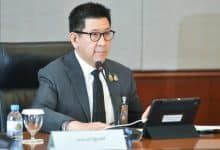Thai prime minister pressures Bank of Thailand for rate cut

The Bank of Thailand (BoT) is under increasing strain today as Prime Minister Srettha Thavisin publicly urges a 25 basis point reduction in rates. The demand is part of a continued push from the government for the BoT to decrease interest rates, a tactic it views as crucial for stimulating an economy it believes to be struggling.
The government also plans to secure loans of over 500 billion baht to fund its digital wallet handout scheme. The Monetary Policy Committee’s (MPC) meeting today, February 7, occurs against the backdrop of a policy interest rate at its maximum in ten years, standing firm at 2.50%.
PM Srettha yesterday reiterated his insistence that the BoT takes action, stating that a 25 basis point rate cut would benefit the public without causing inflation. He pointed out that inflation has been negative for several months and falls below the lower limit of the BoT’s target range. Consequently, even after reducing the policy rate from 2.5% to 2.25%, there would be ample room for further cuts.
“Should a crisis or similar event occur, there’s plenty of scope for further rate cuts. Why not start now?”
The 61 year old Thai prime minister also mentioned plans to discuss the issue with the BoT governor, explaining that communication has been ongoing via the Fiscal Policy Office in a direct and non-aggressive manner.
“The real issue isn’t inflation; it’s deflation. Now is the time to cut interest rates. I hope the MPC will consider this at their meeting on Wednesday.”
The Bangkok-born Sretta previously criticised the central bank on his Twitter account last month, accusing them of damaging the economy by maintaining an elevated interest rate despite months of declining inflation. This followed his January 3 Parliament speech suggesting that the central bank should take into account the nation’s economic risks, including its fragile recovery when deciding monetary policy.
Economy’s issues
Phumtham Wechayachai, Deputy Prime Minister and Commerce Minister, emphasised the government’s implementation of fiscal policy to address the economy’s issues. He stressed the importance of synchronising fiscal and monetary policies and questioned the BoT’s future actions regarding interest rates.
Despite the BoT’s indications that further rate tightening is unnecessary, recent comments from BoT Governor Sethaput Suthiwartnarueput suggest the regulator may not be quick to ease rates. However, analysts anticipate that the MPC will prioritise stability at today’s meeting and leave the policy rate unchanged.
Phornchanok Cumperayot Kouwenberg, a lecturer at Chulalongkorn University’s economics faculty, argued for the BoT’s independence to maintain economic stability. The MPC began raising rates in August 2022, incrementally increasing them eight times by 0.25 percentage points, culminating in a decade-high 2.5% borrowing cost in September last year. This trend came to a halt in November 2023.
Thailand’s policy rate is currently the lowest in Southeast Asia, averaging between 3.25% and 3.5% in the region. The country’s inflation is also lower than its neighbours. Given the US Federal Reserve’s postponement of rate cuts, analysts predict the MPC will keep its policy rate steady to prevent capital outflow. The US Federal Reserve’s overnight federal funds rate currently stands at 5.5%, significantly higher than the BoT’s 2.5% policy rate, reported Bangkok Post.
Latest Thailand News
Follow The Thaiger on Google News:


























